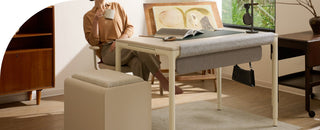There’s a new narrative spreading fast—and it’s dangerous for real design.
Over the past few weeks, platforms like TikTok and Xiaohongshu (RED) have lit up with videos showcasing what creators are calling “A-grade” factory direct goods from China. The pitch? That many premium Western brands are simply repackaging products from the same factories and reselling them at five times the cost.
What’s being pushed as the “China A-goods trend” is gaining traction by blurring the line between design brands and mass-market OEM resellers. It’s a compelling narrative for anyone hunting for a deal—but it risks flattening the real differences between thoughtful, original design and generic, price-first production.
Now, a wave of creators (not always credible) are encouraging people to skip the brand and buy directly from Chinese OEM factories, even with a 145% tariff—because it’s “still cheaper.”
As a result:
-
Searches for “Alibaba” are rising
-
Apps like DHGate and Taobao are climbing U.S. app store rankings
-
A growing group of American buyers now see “brand = overpriced middleman”
But while that narrative may feel empowering on the surface, the truth is more complicated—and far more important for anyone who values quality, longevity, and responsible manufacturing.
What’s Really Behind the “A-Grade” Factory Trend
 The rise of "factory direct standing desk" content is making waves because it plays into a growing skepticism: OEM vs design brand. Creators claim there’s no real difference—just markup. But there is a world of difference between something built by a design brand and something churned out by an anonymous OEM.
The rise of "factory direct standing desk" content is making waves because it plays into a growing skepticism: OEM vs design brand. Creators claim there’s no real difference—just markup. But there is a world of difference between something built by a design brand and something churned out by an anonymous OEM.
It’s easy to see why this movement is catching on. There are thousands of generic OEM factories in China producing everything from clothes to electronics to standing desks. And yes, some Western brands do simply pick a pre-made design, add a logo, and mark it up. This is where the viral “truth about rebranded products” videos get their fuel.
But here’s the key detail most of these creators leave out: not all brands operate this way. In fact, the best ones don’t.
What TikTok is calling “A-goods” often refers to mass-produced, spec-tier items meant to hit a price point—not to reflect thoughtful design, durability, or long-term support. You might get something that looks similar at first glance—but it's not the same product, not the same materials, not the same quality control, and definitely not the same experience if something goes wrong.
What beflo Actually Does—and Why It Matters
 At beflo, we don’t white-label generic furniture.
At beflo, we don’t white-label generic furniture.
We design everything from scratch in our Brooklyn studio—starting with the functionality, form factor, user experience, and even the tiniest finishing touches. The Tenon desk wasn’t born from a catalog. It came from months of sketching, prototyping, and engineering with one goal: to make the smartest, most intuitive desk possible for people who spend hours at it every day.
Then we manufacture responsibly in Taiwan—an intentional choice for those seeking a smart desk not made in China—using custom tooling, precision-milled parts, and exacting quality standards. Our touchscreen, app integration, internal cabling, and aluminum frame system are all bespoke. None of this is off-the-shelf.
Could we have saved money by using a stock frame and rebranding a premade top? Of course. But that’s not why we started beflo. We're not here to race to the bottom. We're here to raise the bar.
Brand Should Mean Something

Let’s be honest: "brand" has become a dirty word to some. And if a brand is just a sticker, that criticism is fair.
But real brands do more. They take responsibility for their supply chains. They think deeply about user experience. They offer service, not just shipping. They make things that are meant to last—not just sell fast.
To us, brand means being accountable for the full journey—from first sketch to final screw to follow-up support years later. That’s what separates a design brand from an OEM shortcut.
So Should You Go Factory Direct?
If price is the only thing that matters, factory-direct standing desks may look tempting. But if you care about build quality, design integrity, long-term value, and where your products actually come from—ask more questions.
Where was it engineered? Who supports it after the sale? What’s it made of? How was it tested? What happens if a part fails next year?
A desk isn’t just a price tag. It’s something you use every day. It shapes how you work, how you feel, and even how healthy you stay.
At beflo, we welcome comparison. We don’t hide behind a logo. We build everything with intention—and we’re proud to show our process.
Ready to experience the difference?
See how design, engineering, and ethics come together in the Tenon desk.
→ Explore the Tenon smart desk collection




